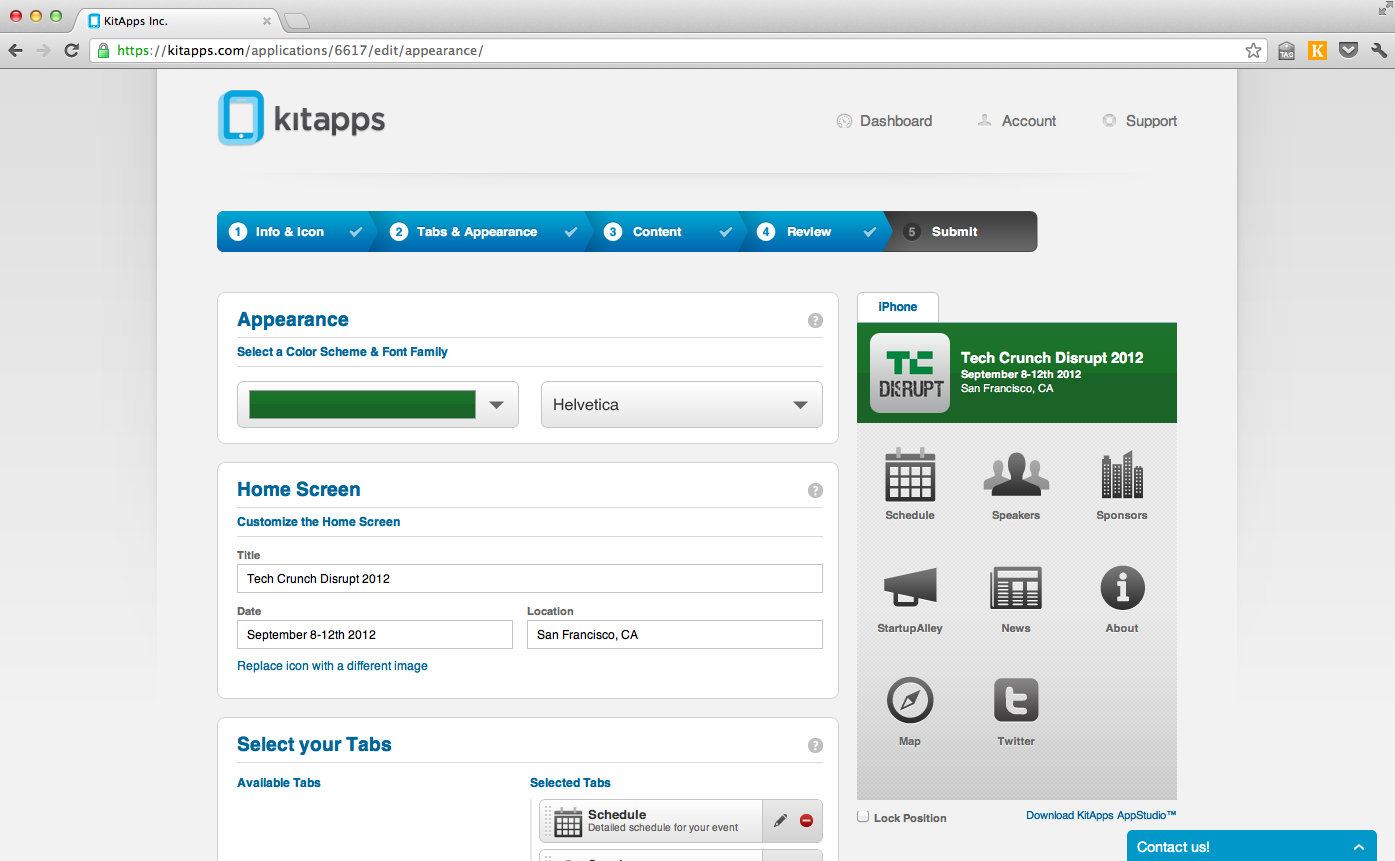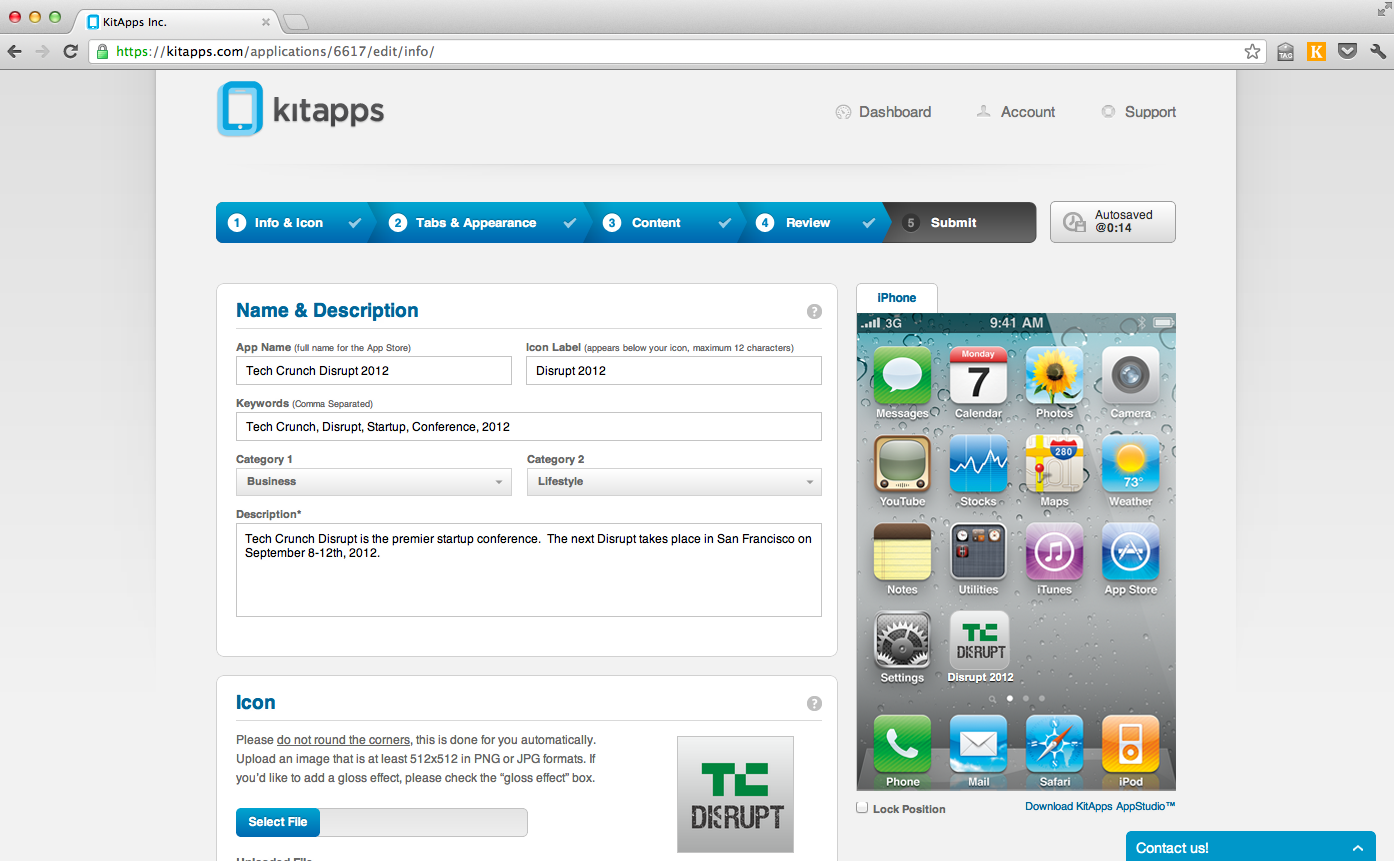It’s a familiar scenario for small business owners: You want your business to have a mobile presence, ideally native on Android and iOS, but you don’t want to pay a developer an armload to build that presence. You would do it yourself (after all, 12-year-olds can do it), but there’s no point in having a mobile presence if it’s just going to look sloppy. That just hurts your brand.
While a slew of DIY app development tools have popped up to address this pain point, unfortunately many of them remain difficult to use, expensive, and either come with too much or too little functionality. That’s why KitApps is today launching a mobile app “wizard” that offers a fully-guided, step-by-step app making process that removes the guesswork endemic to DIY tools.
The Los Angeles-based startup’s first app template targets the event industry, giving planners and organizers a quick way to turn their conference guide into a native iPhone or Android app. The solution aims to differentiate itself from those tools that require users to start from scratch or piece together an app using disparate building blocks. KitApps targets novices and small business owners, specifically, allowing them to build an app in 30 minutes.
At each step of the process, users are prompted for information about their business, and that content is integrated into features that are tailored to their industry, resulting in a product that allows users to prominently feature their clients’ brands while maintaining design consistency for the benefit of the end user.
Event planners are given the ability to add schedules, speaker and sponsor profiles, Twitter feeds, and maps, etc., at a cost of $249/year — a price that includes unlimited downloads and content updates.
KitApps’ launch and initial targeting of the event industry is especially relevant given Cvent’s recent acquisition of event app developer Seed Labs and CrowdCompass. Mobility for the event industry has come to the fore of late, and it’s for good reason that Cvent — one of the world’s largest event management companies — is beginning to make a big push to bring its enterprise customers and their end users a mobile solution. The demand is there.
This is a signal of an appetizing market opportunity for KitApps, and with Cvent scooping up what it declared to be two of the best (small) event app development operations on the market, there’s room now for independent startups to flourish.
When we asked KitApps co-founder Michael Balyasny why users should opt for KitApps among a crowded field, he said that he thinks the startup’s speed of development (30 mins) and price point ($250/year) are two of its biggest value propositions. “With KitApps, you’ll be done building a quality iPhone or Android app before a sales rep from one of these companies even called you back,” he said.
That being said, the team is aware that it needs to add more social offerings to its solution if it’s going to stand out. So, next up, Balyasny says that the team is going to update KitApps’ event template so that organizers can integrate social functionality more meaningfully, automatically generating a news feed for everything that goes on at an event or pulling from existing social networks to give users an easy way to contribute content directly from the app, for example. The co-founder says that they expect to push an updated version in the next month.
The other key feature for KitApps — to help ensure that novice users avoid missteps — is that users get to see an instant preview of everything they do, so that they can test the app on the fly. Because the team has focused on making the process structured and easy-to-navigate, the whole development UI also tends to be cleaner and more streamlined than others of its ilk. Obviously, this comes with positives and negatives depending on the use case, but for many small business owners, reducing the room for deviation can be huge.
Thus far, KitApps has focused exclusively on a DIY app-building process for events and event organizers, but the team plans to expand into other verticals in the near future — for restaurants, eCommerce, education, real estate, etc. Although Balyasny says that the team is proceeding with caution, because they want to make sure that any app solution they launch is tailored to a specific industry — so that the resulting apps are actually useful for end users.
And that’s the problem he sees with many of the current solutions. They are one-size-fits all and cater broadly to a number of industries, using the same templates. So, lawyers and real estate agents are using the same template to build an app and then publish on an app store. Most of these are junk, and don’t provide any real benefit for end users. The point then, at least in KitApps’ conception, is to focus on building wizards that are tailored to each industry. What’s the point of a law firm using equipment that’s designed for an event marketer?
Another interesting differentiator for KitApps? They’re one of the few startups based in the U.S. that’s raised seed funding from investors in Ukraine — where the majority of the startup’s team (and its other co-founder, Artyom Yaremchuk) are located. “We think that having a team in Ukraine — that’s not outsourced but our own — gives us a competitive advantage in untapped markets,” the co-founder said.
KitApps currently only offers support for iOS and Android, but support for web apps is due in the next few weeks. Then it’s onto Windows.
It may be that the market doesn’t need another DIY app development solution, but it seems there could be enough differentiation here to give a bit of promise to KitApps. But, in the end, it’s really all about the product. From what we’ve seen so far, it is in fact easy to use and the apps are far from being eyesores. But there’s a long way to go.
What do you think?


